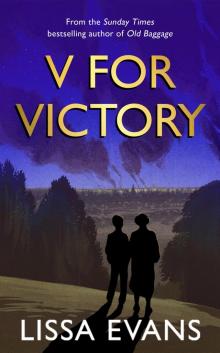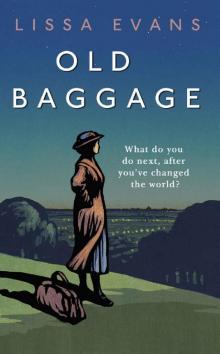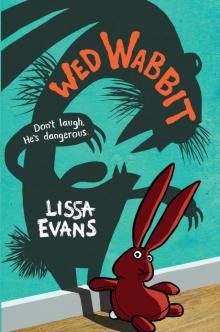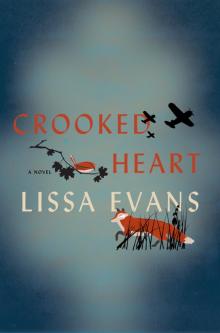- Home
- Lissa Evans
V for Victory Page 6
V for Victory Read online
Page 6
‘Blimey.’ Winnie started to leaf through the book. ‘Do you know what the phrase “inoculation of truth” reminds me of?’
‘No, what?’
Winnie straightened her shoulders and tuned her voice to a foghorn. ‘“Say not the needle is the most proper pen for women.”’
‘I beg your pardon?’
‘Don’t you remember? It was one of Miss Simpkin’s quotes when we were in the Amazons. Together with “Abused patience turns to fury.”’
‘I’d forgotten,’ said Avril. ‘Don’t read the book now, though – let’s not waste time when we could be talking. How’s Emlyn?’
‘Oh, he’s—’ Winnie frowned and turned back a page. ‘Binnie,’ she said, staring at the top paragraph. ‘Binnie?’
‘It’s short for Belinda.’
‘“Binnie, for God’s sake, come back to bed.”’
‘No, don’t read it out loud.’
‘“A flare lit the room through the uncurtained window and an illusive surge of green light, unsounding, sentient, filled the space.”’
‘Please don’t.’ Avril reached for the book, but Winnie leaned away from her, still reading, her tone incredulous.
‘“Roderick’s profile had an ancient blankness, as of a frieze in a torch-lit passageway. Binnie turned, silently, knelt on the mattress and slid her cushioned form alongside his. ‘If we died now there’d be no more pretence,’ she said. She imagined their two bodies fused by violence into one melded, bloodied being, ensexed eternally.”’
Winnie caught the eye of the couple at the next table, both listening avidly. ‘Are you enjoying it?’ she asked. ‘It’s about me.’ The man turned pink.
‘Twinnie—’
Winnie put the book on her lap, and resumed eating, very fast.
‘Twinnie, it’s absolutely not about you.’
‘Except we’ve got exactly the same name, almost.’
‘That’s just a coincidence. Her lover’s the only one who calls her that.’
‘She’s fat.’
‘She’s not.’
‘So “cushioned” means “thin”, does it?’
‘No, it means “voluptuous”. And she’s having an affair with a married man, which I’m sure you’re not.’
‘How do you know?’
‘Well—’
‘You don’t know, because, as you pointed out, I don’t tell you anything, and thank God I don’t. Do you want that soup, because I’m not staying for the second course?’
Without receiving an answer, she swapped the bowl with her plate, and started spooning up the lukewarm contents.
‘The thing is,’ she said, between mouthfuls, ‘whatever you say, everyone will think it’s about me.’
‘Twinnie—’
‘Don’t call me that, please. I must have asked you about fifty times not to. And this isn’t actually very nice soup. I’m glad I’m not paying for it.’ She dropped the spoon with a clatter and stood up, the book in one hand and a certain amount of consommé de bœuf on her sweater. Avril looked up at her with amused wariness, as if observing a drunk on the Tube.
‘I wanted to tell you that Clive’s going to host a little New Year’s Eve party to celebrate the publication,’ she said. ‘I do hope you’ll come, and I also hope you’ll read it, and find out that there’s really nothing to get so annoyed about.’
Winnie’s snort made even the pianist falter. Resisting the urge to lean across the table and slap her sister, she walked away, the feeling of justified outrage propelling her up the stairs and out of the restaurant, and then bathetically back into it again, since she’d forgotten her coat and hat.
A wind like an Alaskan river was sweeping along the road and she leaned into it, re-running the conversation in a vehement mutter and this time trouncing Avril with a series of crisp responses that left her twin both defeated and apologetic. ‘I’ve been so dreadfully thoughtless,’ said Avril, tears in her eyes. ‘At last – something we can agree on!’ rapped out Winnie, rather like Gertrude Lawrence in Private Lives. ‘Yes, Avril has the cruellest mouth,’ she added, cleverly, turning her head to see the reaction of the other diners and instead meeting the alarmed eye of a small boy pushing a pram.
‘Hello,’ she said, attempting to rearrange her expression into something more friendly. ‘I hope your baby’s wrapped up warm.’ He broke into a wordless sprint and passed her at speed; the pram was full of coal.
‘Oh, damn,’ she said, recalling the dreary agenda for the meeting she would be having with the sector fire-chief, later in the afternoon. The inadequate night supervision of the local emergency coal dump was the second item, preceded by a discussion on what to do about the static water tanks in the district – they were all frozen solid and local children would keep breaking through the wire and sliding on them. And then there was next month’s shift schedule to draw up, and a letter to write to the council about shelter sanitation, and she could feel her adult-self reassembling, the pieces bolting together, armour covering the raging, skinless goblin she became when she was with Avril. ‘Just laugh at her,’ Winnie’s friend Elsie had once urged. ‘Laugh right in her silly mush, tell her you don’t care what she thinks of you.’
‘But I do care,’ Winnie had said. ‘That’s the trouble.’
It wasn’t until she was standing on the Tube platform, skimming through Tin Helmet on the look-out for egregious mistakes, that she suddenly remembered her encounter in the ruins of Falcon Road with the pleasingly odd boy who had turned out to live in Miss Simpkin’s house – she owed him a letter about that church carving, now that she came to think of it.
Of course, there was someone who had never cared about the opinions of others: Winnie pictured Miss Simpkin in the middle of Hampstead Heath, eye-glasses askew as she demonstrated the basics of ju-jitsu, utterly unruffled by the stares of passing strollers. Yes, that was the way to do it. Bold. Lofty. Unafraid.
A man was selling bunches of holly in the street outside St Pancras Coroner’s Court, and berries were scattered across the pitted ice. Vee was unpleasantly reminded of the previous week, when she had slipped on the pavement outside the grocer’s and dropped the tiny jar of maraschino cherries for which she’d just paid six shillings (six shillings!); the glass-strewn contents had looked like the obscene aftermath of an explosion. She’d been planning to save the cherries for the Christmas dinner table, to go with the pink blancmange that Noel had decided on for dessert, but now he’d just have to make do with evaporated milk.
‘That holly was sixpence a bunch,’ said Noel, as they followed the usher downstairs. ‘It’s a pity that the tree in our garden is male.’
‘I beg your pardon?’
‘Only the female trees bear fruit. Hollies are dioecious, you see.’
‘You’ll need to wait through here,’ said the usher, indicating a door. He had pince-nez and the pursed expression of someone who’s just chipped a tooth. ‘Obviously, the boy can’t go into the courtroom with you.’
‘He’s just here to keep me company,’ said Vee. ‘Ooh, it’s warm,’ she said, opening the door.
‘It’s next to the boiler-house. The conveniences are through there and to the left, should you need them.’
With the door closed, it was as balmy as July. Vee sat on one of the long benches against the wall and took off her gloves.
‘How are you feeling?’ asked Noel.
‘I’d be better if you didn’t keep asking me.’
‘Do you want a cigarette?’
‘What?’
‘I brought some with me, in case you needed to stay calm.’
‘You didn’t!’
He grinned, and slid a packet of Woodbines out of his coat pocket.
‘I’m all right for the time being,’ she said. ‘Anyway, they might make me cough in court.’
‘I had a talk with Mr Jepson, and he said most likely all that will happen is that your statement will be read out, and you’ll be asked if it’s correct. The coroner or the counsel for the r
elatives may ask a supplementary question or two, but that should be it.’
‘Good.’
‘It won’t be like being up in front of the magistrate.’
‘Shhhh.’
‘There’s no one else in here.’
‘Even still.’
‘I just mean that any questions will simply be to elicit information. You’re not in any personal trouble.’
‘I know that. I know. It’s just … just …’ And she was back in the St Albans magistrates’ court, the oddly greenish light filtering through window-glass so ancient that the view of the rooftops seemed to ripple. During her four visits there – three for non-payment of rates and one for alleged shop-theft – Vee had attempted to keep her gaze fixed on the wooden roses in the panelling just above the bench, so that she wouldn’t have to see the expressions of contempt. One old goat – a retired surgeon – had called her ‘a very tiresome woman’, and a lady magistrate with a car and a chauffeur waiting outside, and a hairstyle that looked like a zinc cauliflower, had suggested that Vee ‘simply didn’t try to make an honest living’, which was unfair and only partially true, given that she had actually been working in Woolworths at the time she was supposed to have swiped a scarf from their silks counter. She’d avoided a sentence for that one only because the hearing had come directly after lunch and one of the magistrates had audibly fallen asleep during the shop-walker’s statement, before waking with a grunt of ‘yes, please’ while holding out an invisible wine glass to an imaginary waiter. There’d been laughter from the public gallery and the case had been brought to a hasty close; Vee had got off with a warning, lucky for her.
‘And of course,’ said Noel, ‘there’s the essential difference that this time all you have to do is tell the truth.’
She gave him a look.
‘I’m not being facetious. Honestly. Honestly, Mar.’ He sounded genuinely contrite.
‘You just read your book,’ she said, and he took out something with diagrams in it.
Of course, she’d been Vera Sedge back then, and not Mrs Overs, a respectable Hampstead landlady in a good coat – ‘good’ being a relative term, of course, for something bought second-hand in 1936, but she’d recently re-lined the worn collar with stiffened navy-blue velvet cut from an old evening bag she’d found in a cupboard, and had used the rest of the bag to make a new hat-band. When she’d inspected herself in the hall mirror before leaving, she’d been satisfied by the general impression. You’d trust that coat.
She leaned her head against the wall, wishing she’d brought her knitting, and the next thing she knew, the usher was calling her name and she’d risen in a fluster, dropping a glove.
‘No need to get up,’ he said. ‘There’s been a delay. The principal witness still hasn’t arrived.’
‘Oh, hasn’t he?’ As she sat down again, she glanced at Noel and saw him discreetly cross his fingers. ‘Would that be the lorry driver?’ she asked.
‘Yes, the American soldier. Sir Bentley’s very annoyed.’ The usher spoke with a certain satisfaction, as if there’d been a sweepstake as to the exact degree of the coroner’s annoyance, and he personally had put a half-crown on ‘very’. ‘This is far from the first time that this has occurred,’ he added. ‘Sir Bentley put in an official complaint only last week, but clearly to no avail.’
‘Oh dear.’ Vee tried to look disapproving. ‘So do I need to stay?’
The usher lifted his watch from his waistcoat pocket and checked the time.
‘Sir Bentley has said he will wait until eleven before postponing, so that’s another twenty minutes.’
‘Where does that leave me?’ called a man sitting at the other end of the room, who must have turned up while Vee was dozing. ‘I’m a witness in the McCromarty case.’
‘I’m afraid I can’t tell you,’ said the usher, ‘though clearly it won’t begin on time.’
‘I’ve got to get back to work.’
‘Could you telephone your employer?’
‘No.’
‘Why not?’
‘Because I don’t have one. Got my own window-cleaning business.’
‘I’ll endeavour to keep you informed,’ said the usher, actually sliding out of the room during the final word of the sentence.
‘Endeavour,’ repeated the man, derisively, folding his arms. He was fifty or sixty, suited and newly shaven for the court, his skin as mottled as if he used a scouring pad instead of soap. ‘This is a lark, I don’t think.’
‘At least it’s warm,’ said Vee. ‘This weather must be terrible on your hands, in your line of work.’
‘It is, yes.’ He sounded gratified. ‘I used to put paraffin oil on them every night, but you can’t get it now. Mac – that’s what we used to call McCromarty – he swore by goose grease, not that you can get that neither.’
‘Was he a friend of yours, then?’
‘I knew him. I can’t say he was a friend.’
‘Enemy?’ suggested Noel.
‘Enemy? No, we was in the same trade, we worked the same patch, didn’t we, so he had his houses and I had mine.’
‘Rivals, then.’
‘Yeah. Rivals. But friendly.’
‘So what happened to him?’ asked Noel.
‘Well, that’s the question, isn’t it? What happened to him?’ The man folded his arms and leaned back, weighty with knowledge. ‘That … is … the … question,’ he repeated, nodding a few times.
‘And what’s the answer?’ asked Noel, who still didn’t know how to play along with these little manly games.
‘Go on, do tell us,’ said Vee, encouragingly.
The man turned slightly, so that he was definitely addressing Vee rather than Noel.
‘Well, I clean at four, six, eight, fourteen and twenty Wintergreen Terrace every other Wednesday, though it should be every week now, there’s that much filth in the air. We have a joke about it – there’s either no windows, or you can’t see through the ones you’ve got. Anyhow, Mac does the other side of the street on the same day, and then my next call is Myddleton Square and he goes on to Fairleigh Crescent. So on this particular day, I finished ahead of him, and I’d only walked a hundred yards when there was a bang and a whoosh and I was face-down in a hole.’
‘A rocket?’ asked Vee.
He nodded. ‘It landed smack in the centre of the road just at the end of Wintergreen Terrace. Water-main burst, all the roofs off, but no one dead. They thought.’
‘McCromarty was underneath it,’ said Noel.
‘Oh, so you know the whole story, do you?’ said the man. ‘Then you carry on and finish it, sonny.’
‘Sorry, it was just a fictive prediction,’ said Noel, stiffly.
‘He doesn’t mean it,’ said Vee, as if apologizing for the village idiot. Noel opened his book again.
‘So go on,’ said Vee. ‘I’m on the edge of my seat. Why’s it come to court?’
‘Well, that’s the nub, isn’t it?’ he said, slightly mollified. ‘They didn’t find no definite bits of him so they can’t prove he’s dead. And if they can’t prove it, then his wife’s not a widow and she can’t get the insurance, or the pension, so what they do is weigh up all the evidence, such as who saw him last – which was me – and where he was headed, which was Fairleigh Crescent. It’s called the balance of probabilities. Of course, there’s another side to it – they want to stop people skipping off.’
‘Skipping off?’ repeated Vee.
‘Hearing a bomb and taking the opportunity of doing a flit. Say McCromarty didn’t get on with his old lady, and had a young lady somewhere else, or say he owed money, or he done something he shouldn’t have and the police was after him – he might think, This is my chance. If I disappear now, everyone will think I’ve copped it. And then he might call himself another name and start again in another town. There’s all sorts of fiddles they have to look out for.’
Vee didn’t trust her own voice; instead she cranked her features into a facsimile of innocent intere
st. Beside her, Noel seemed to have turned to stone.
In the momentary silence, they all heard the noise of fast and heavy footsteps approaching, and a blare of overlapping voices.
‘—and he said he couldn’t do that because he did not have a snow shovel, and I said—’
‘Is it that door, or is it the one on the left?’
‘—that cannot be called snow, that is powdered sugar, and what you need, sir, is a spoon.’
‘Americans,’ muttered Noel, as the door opened.
A huge figure in a great-coat entered first, head almost scraping the lintel, felt cap rammed on dark hair, big features in a flushed face, and he was followed, like a perfect punchline, by a short, neat, colourless man in officer’s uniform.
‘Wrong door,’ said the second. He disappeared again, and the first raised his hand apologetically and said, ‘Please excuse us for the disturbance!’ at the sort of volume that you might expect from someone hailing a taxi during a violent rainstorm, and as he turned to go again, Vee realized, with absolute certainty, that he was the man she’d seen through the windscreen of the lorry. The door closed.
She swayed slightly, as if caught by a gust of wind, and she felt Noel put a hand on her forearm. ‘You’ll be fine,’ he said.
It was another forty minutes before Vee was called into court, though it felt like a week, and by that time, her mouth was so dry that when she confirmed in front of the coroner that her name was Margery Olive Overs (so help her God), every word was accompanied by little creaks and snaps, as if her lips were made of leather.
For the first time, she learned the dead man’s name: Frederick Embleton. He’d been seventy-two, a retired plumber, and his wife was in the courtroom with a grown-up daughter on either side of her. The old lady was dry-eyed, as upright as a pea-stick, and the daughters were hunched and weeping; Vee could hear their occasional shuddering breaths under the voice of Sergeant Bayliss, who was reading out her own statement in a steady monotone.
‘“I heard a shout and I looked over and saw the lorry turn left out of the side road opposite but instead of going into the nearest lane, it went right across the road and then turned, so it was going the wrong way, against the traffic. A taxi was coming straight towards it. The lorry braked and then seemed to skid. It went off diagonally and pinned the gentleman between the front bumper and the bus stop.”’

 V for Victory
V for Victory Old Baggage
Old Baggage Wed Wabbit
Wed Wabbit Big Change for Stuart
Big Change for Stuart Spencer's List
Spencer's List Horten's Incredible Illusions
Horten's Incredible Illusions Horten's Miraculous Mechanisms
Horten's Miraculous Mechanisms Their Finest Hour and a Half
Their Finest Hour and a Half Crooked Heart
Crooked Heart